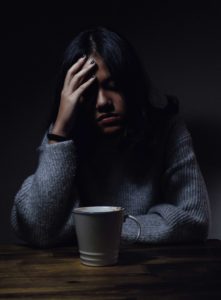Depression is a common theme in the modern world. On TV and in movies, we see popular fictional characters that are battling depression with reasons ranging from romantic breakups to constant stress at work. And on social media, friends, family and even celebrities claim that they are depressed echoing similar sentiments as the fictional ones.
 Whether people choose to believe their friends’ depression claims or not, depression is a real issue. According to the National Institute of Mental Health (2016), around 6.7% of adults in the US suffer from depression. San Diego Christian Counseling offers support for those affected by this condition.
Whether people choose to believe their friends’ depression claims or not, depression is a real issue. According to the National Institute of Mental Health (2016), around 6.7% of adults in the US suffer from depression. San Diego Christian Counseling offers support for those affected by this condition.
Women suffer more from this than men and the age group that experiences major depression the most for either gender is that of 18 to 25 years of age. This mental issue also does not favor any particular ethnicity as all races suffer from it.
Because of the stimuli and the reality of it, many people believe that they too may be dealing with “depression” as they wrestle with constant setbacks in life or struggle with a lack of motivation in what they do. But despite similar symptoms to what is shown in mainstream media or social media, not everyone is truly suffering from depression.
While setbacks in life can cause someone to feel very sad for days on end, true clinical depression lasts longer than that. So the question many ask is, “How do I know if I’m really suffering from depression?”
Symptoms of Depression in Adults
1. Changes in Emotions
An initial sign of depression is an increase in mood swings. A person generally becomes more irritable or angry. There is also a feeling of restlessness or tension.
In addition, feelings of guilt or regret about past occurrences begin to crop up as if much of what was done in the past was the person’s fault. As these guilty feelings compound, a sense of worthlessness and hopelessness ensues causing that person to have thoughts about death. Crying spells may then occur. All of these symptoms cause the person to feel very distressed.
Some noticeable thoughts when one is depressed:
- “It’s all my fault.”
- “Things are never going to become better.”
- “My family will be happier without me.”
2. Loss of Interest
 A person who is undergoing depression usually lacks energy and motivation to do the things they usually did before. Hobbies and extracurricular activities become meaningless. Rather than going out with others, the depressed person would rather just stay at home, oftentimes alone.
A person who is undergoing depression usually lacks energy and motivation to do the things they usually did before. Hobbies and extracurricular activities become meaningless. Rather than going out with others, the depressed person would rather just stay at home, oftentimes alone.
Even the necessary activities like grocery shopping or even going to work or school may be difficult to do. For those who still manage to work or attend school, the lack of motivation is quite present and others often take notice of this.
Relationships are often strained when one is experiencing depression as the person is not excited anymore to see their significant other. The sex drive takes a hit and the person begins thinking that their loved one is better off with somebody else.
Some things a depressed person may say to others:
- “Yes it’s the regular pickup game later but I don’t have the energy today. Maybe next time.”
- “Sweetie, can we just go out next week? I don’t feel like going out tonight.”
- “I don’t feel like going to work today. I don’t see the point anymore.”
3. Drastic Change of Weight
Though in today’s society the goal for many is to lose weight, a drastic loss of weight is another sign of depression, especially when coupled with a lack of energy. This usually occurs due to a lack of appetite which often coincides with a loss of interest in doing other daily things.
However, depending upon the individual, a rise in weight may also be a sign of depression. For some, their response to deep sadness is to reach for their comfort food so they tend to eat more than usual.
Some noticeable thoughts when one is depressed:
- “I don’t feel like eating again. Nothing tastes good anyway.”
- “Eating makes me feel better after I cry.”
- “They say I’m getting bigger again. Well, it doesn’t matter. I don’t care what they think.”
4. Change in Sleep Patterns
 A change in sleeping patterns is another symptom of depression. Oftentimes the person has difficulty falling asleep and staying asleep. Sleep often occurs well past the usual time with the person’s mind either busy with dizzying thoughts or just blank.
A change in sleeping patterns is another symptom of depression. Oftentimes the person has difficulty falling asleep and staying asleep. Sleep often occurs well past the usual time with the person’s mind either busy with dizzying thoughts or just blank.
The sleep itself, however, is often fitful with the person waking up every now and then. The overall experience is very frustrating as this may lead to a feeling of constant drowsiness, yet with continued difficulty getting proper rest.
However, for others, depression may have an opposite effect. Some suffer from hypersomnolence where they may sleep excessively, either during the day (e.g. long naps at work) or at night, yet they still feel very lethargic as if there was no real rest.
Some noticeable thoughts when one is depressed:
- “I sleep for 12 hours every night but I’m still always sleepy and tired.”
- “I feel so exhausted every day but I have a hard time falling asleep.”
- “I’m seemingly up all night. I fall asleep but I wake up again. I just can’t rest properly.”
5. Physical Changes
 Another sign of depression is a change in a person’s physical health. Other than the weight changes and difficulties when sleeping, people with depression experience other physical issues like stomach pain, digestive problems, headaches and other pains.
Another sign of depression is a change in a person’s physical health. Other than the weight changes and difficulties when sleeping, people with depression experience other physical issues like stomach pain, digestive problems, headaches and other pains.
Others also have a feeling of being “slower” than they usually are. In their mind, they feel like they are speaking slowly, moving slowly, and even thinking slowly. Memory loss is also another result.
Some noticeable thoughts when one is depressed:
- “It’s so hard to concentrate every day. My headaches are killing me.”
- “I feel so slow. I can’t seem to work fast enough.”
- “Why do I keep forgetting things? I’m going to get fired if I forget another deadline.”
Seek Christian Counseling for Depression
In this fast-paced, stressful and complex world, symptoms of depression have become common. Depression saps the joy from life and causes many other problems that hurt not only the sufferer but the people who rely on them. Sadly, many people are not aware that they are suffering from it; and those who do know rarely seek professional treatment.
But things do not have to be like this. With the help of a professional Christian counselor, the sufferer can overcome the symptoms of depression and return to a normal life. Not only will the Christian counselor help identify the underlying issues, but they will also connect the sufferer to God and Scripture.
In this way, the probability of falling into depression again will be minimized, if not eliminated, as the sufferer will get to know God who strengthens us in times of trial.
The LORD himself goes before you and will be with you; he will never leave you nor forsake you. Do not be afraid; do not be discouraged. – Deuteronomy 31:8
If you or a loved one is suffering from depression, then seek professional help from Counselors at San Diego Christian Counseling soon. Life is meant to be lived with joy and hope in Him.
“Depressed”, Courtesy of AnhNnguyen, Unsplash.com, CC0 License; “Down”, Courtesy of Mitchell Hollander, Unsplash.com; CC0 License; “Depressed”, Courtesy of Alex Boyd, Unsplash.com, CC0 License; “Laundromat,” courtesy of Drew Roberts, unsplash.com, CC0 License


